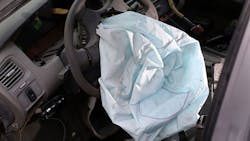Honda Said to Irk Takata Stakeholders by Going Slow on Deal
As air-bag maker Takata Corp. (IW 1000/616) courts buyers to resolve the auto industry’s biggest recall ever, stakeholders are getting frustrated with the speed of decision-making by top customer and shareholder Honda Motor Co. (IW 1000/19), according to people with knowledge of the deliberations.
Honda hasn’t played a leading role in talks the world’s automakers are having with Takata over its future, according to officials at four other carmakers, who asked not to be identified because the deliberations are private. An executive at one of Takata’s lenders said Honda has been less active than its peers in deliberating whether sub-suppliers to Takata would be able to survive a potential bankruptcy.
As the company with the biggest exposure to air-bag recalls and the deaths and injuries caused by the faulty devices, Honda has the most to lose in negotiating the cost-sharing needed to find suitors for Takata. Pressing too hard against Takata also would be risky -- its failure could disrupt a major link in Honda’s parts supply chain.
“Honda is in a position to make sure Takata stays in existence, simply because they are the biggest customer and had the most recalls,” Ken Miyao, an analyst with Tokyo-based market researcher Carnorama, said by phone. “The recalls at some of the other carmakers are much smaller in scale. They will count on Honda to negotiate with Takata.”
Honda believes it’s in proactive discussions on best measures to cope with Takata’s issues, spokesman Ben Nakamura said.
Without buy-in from Honda, which accounted for about 14% of Takata’s sales last year, the supplier is unlikely to reach agreement with the roughly dozen other customers it’s been meeting with to pick between bids by rival air bag companies and private equity suitors. A Takata representative declined to comment on Honda’s role in its negotiations with carmakers.
Five Suitors Offer Bids
Takata received offers for initial investment of $1 billion to $2 billion from each of the five suitors seeking to buy the Tokyo-based company, people familiar with the matter have said. The bidders comprise air-bag inflator maker Daicel Corp. and Bain Capital, buyout firm KKR & Co., bumper supplier Flex-N-Gate Corp. and air bag makers Autoliv Inc. and Key Safety Systems Inc.
While all five suitors have raised the option of bankruptcy for Takata, Autoliv and Key Safety are insisting on that course of action, making their bids less favorable, a person with knowledge of the matter said last week. Takata and its financial adviser Lazard Ltd. want to finalize a deal by the end of the year.
Takata needs the sign-off of carmaker customers led by Honda on its plans because the costs of air bag repairs and legal liabilities may exceed the assets on its balance sheet and the amount of investment bidders are said to have offered.
Class Action Lawsuits
Jefferies Group LLC analyst Takaki Nakanishi has estimated the air bag fixes alone may cost about 1.28 trillion yen. Takata reported 404.7 billion yen in total assets as of the end of June. The supplier also faces class-action lawsuits brought by vehicle owners and a criminal investigation by the U.S. Justice Department.
Honda hasn’t changed its position and it won’t give up on recouping recall costs from Takata and won’t provide financial assistance to the company, according to Nakamura.
“However, for the recall cost, there is room to reconsider based on the agreement we will be reaching,” Nakamura said. “Our priority is to keep the flow of supplying the products to our customers and we will make decisions accordingly.”
Honda’s Role
Honda said in May it would recall 21 million vehicles to replace Takata air bags. The maker of Civic compacts and Accord sedans in November 2008 initiated the first repair campaign related to Takata’s flawed air bag inflators, which contain propellant that breaks down when exposed to high heat and humidity. Once the material is degraded, it can lead the inflator to rupture and spray plastic and metal shards at vehicle occupants.
All but one of the 16 motorists who’ve died in fatal accidents involving Takata inflators in the U.S., Malaysia and India occurred in Honda vehicles. About 90 million air bags are due to be replaced in the U.S. and Japan alone.
By Yuki Hagiwara and Takako Taniguchi
About the Author
Bloomberg
Licensed content from Bloomberg, copyright 2016.
